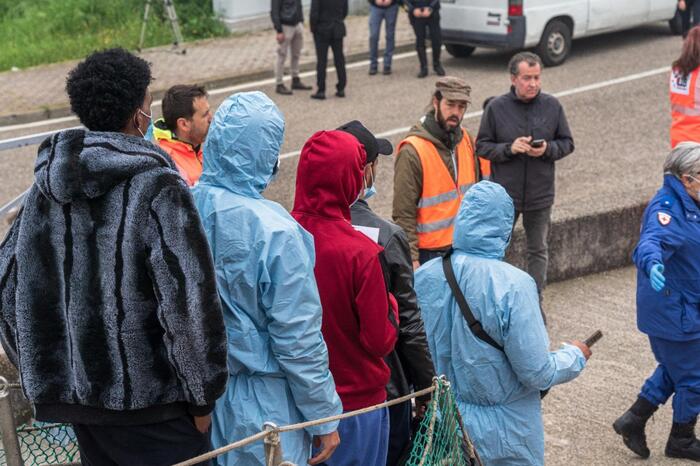Icon: enlarge
Migrant in the remnants of the burned down Moria camp: "Many new Morias threaten to emerge"
Photo: GIORGOS MOUTAFIS / REUTERS
It is shortly after 12 this Wednesday, Ursula von der Leyen is standing in front of the cameras on the ground floor of the Berlaymont, the headquarters of the EU Commission in Brussels.
"The Commission's package on migration and asylum is a new start," said the Commission President.
A fresh start, that is what it should be about in a debate that has led the Union to the brink more than once in the past five years.
After months of delay, the EU Commission is now presenting its proposals for a new asylum and migration policy.
And the first surprise is that the Commissioner himself makes the first serve.
Von der Leyen has been in office for almost a year.
Now she is showing for the first time that she is ready to take the lead on the refugee issue herself.
Von der Leyen, the PR expert, knows the power of images.
Just as the photo of the drowned Syrian boy Alan Kurdi shook many Europeans five years ago, it is now the photos of the burning refugee camp in Moria that are forcing the EU to act.
But von der Leyen's proposals are not revolutionary.
Most of the migration pact is not really new.
It should stand on several pillars:
More
efficient and faster procedures:
In future, newcomers at the EU's external borders are to be registered more thoroughly and at the same time more quickly.
Irregular migrants should not only leave their fingerprints as before, but undergo a full health and safety check.
After a maximum of five days, they should be assigned to different procedures.
Arrivals from countries with a low recognition rate should immediately end up in an accelerated procedure with rapid repatriation.
Fair distribution of responsibility and solidarity:
"The member countries will be obliged to act responsibly and in solidarity with one another," explains the Commission.
Particularly in the event of a crisis, "without exception every member state" must make its contribution to support member states under pressure.
There should be a system of "flexible contributions".
Those who do not want to take in asylum seekers from other EU countries should provide material help to other countries or take on "repatriation sponsorships" - that is, undertake to return rejected asylum seekers to their home country within a certain period of time.
Icon: enlarge
Commissioner von der Leyen at the presentation of the migration pact: "A new start"
Photo: Stephanie Lecocq / dpa
Strengthening the external borders:
The EU's coastal and border protection should be strengthened, at the same time there should be an EU system for the return of rejected asylum seekers.
For this purpose, the office of a "return coordinator" is planned to coordinate the measures of the member countries.
Improved cooperation with third countries:
"Tailor-made partnerships" with non-EU countries should facilitate the fight against smugglers and the withdrawal of rejected asylum seekers.
New rules for legal migration should provide an incentive.
For example, the Commission wants to introduce "talent partnerships" in order to bring workers into the EU that are specifically required by European companies.
Distribution quota is history
Most of this has often been promised or demanded, from the acceleration of the sometimes extremely long asylum procedures to "flexible solidarity" between the member states and improved cooperation with the countries of origin and transit of migrants.
What is characteristic, however, is what no longer occurs: a mandatory quota for the distribution of asylum seekers.
Germany and other countries, where many people had arrived, challenged them for years.
The topic has always been the cause of disputes in the EU.
In September 2015 the interior ministers decided on the mandatory quota - against the votes of Hungary, Bulgaria, the Czech Republic and Slovakia.
These countries still refuse to take in refugees or migrants.
By leaving out the quota, the Commission is now approaching the Eastern Europeans.
In contrast to their proposals from 2016, this time there are no penalties for objectors.
Instead, the Commission is offering 10,000 euros per adult migrant from the EU budget for countries willing to accept them.
However, it is questionable whether the previous objectors will change their attitude.
Because only in "times of increased pressure" should member countries be required to "cooperate more strictly", they say.
The countries could then choose whether to take in asylum seekers or help with their return, said EU Interior Commissioner Ylva Johansson.
In contrast, doing nothing is not an option.
"Many new Morias threaten to emerge"
The central problem: The governments of some countries have long benefited domestically from the unresolved migration issue - above all Hungary's Prime Minister Viktor Orbán, who likes to portray himself as the savior of Christianity from Muslim mass immigration.
It is unclear why he should voluntarily forego this long-running favorite.
Erik Marquardt, migration expert for the Greens in the EU Parliament, sees further weaknesses in the Commission's package - such as the sorting of newcomers based on their country of origin.
"That does not live up to the Commission's claim not to allow new camps like the one in Moria to emerge," says Marquardt.
"On the contrary, many new Morias threaten to emerge."
If those who are given poor chances of asylum should stay on the Greek islands, "then that is practically what we already have," said the Green politician.
The massive acceleration of the process is "a pious wish".
"We heard that about the EU-Turkey deal back in 2016."
It has shown, however, that it is not possible to bring people back to countries that refuse to do so, and that it is not sustainable if there is no perspective in the countries of origin.
"These people are at our limits two weeks later."
"These proposals contradict the idea and the sense of asylum law in and of itself," says Cornelia Ernst, asylum policy spokeswoman for the left-wing group in the EU Parliament.
"It's all about defense, deterrence and, above all, about deportations."
The Christian Democrats in the EU Parliament, on the other hand, praise the migration pact.
The proposals are "a good starting point" for a sustainable asylum system, explained Roberta Metsola, domestic policy spokeswoman for the EPP group.
The member countries should now approve it as soon as possible.
"The others will get a return notice"
It is not yet possible to say whether that will happen.
The Council of EU Interior Ministers will deliver a first reliable picture of the mood on October 8th and 9th.
Federal Interior Minister Horst Seehofer (CSU), who now has to lead the negotiations for the German Council Presidency, was already skeptical at the weekend.
Many EU partners are so angry about Germany's largely unilateral approach to accepting refugees from Moria that they don't even think about dealing in detail with the new legislative proposals.
How difficult the debate is was also shown on Wednesday by a rather impolite objection from Vienna.
Von der Leyen hadn't even presented her ideas on refugee policy to her commissioners when the first rejection came.
The distribution of refugees in the EU "failed", said Austria's Chancellor Sebastian Kurz.
"So many states reject that. It won't work either," said the politician, who also owes his steep career to his tough stance on refugee policy.
Von der Leyen does not propose a mandatory admission of refugees.
The Commission seems to be betting that the problem will get smaller and smaller.
"We are not in 2015 anymore," said Interior Commissioner Johansson.
At the time, at the height of the crisis, 1.8 million people entered the EU irregularly, "and almost all of them were refugees".
In 2019 there were only 140,000 irregular immigrants, of whom only a third were entitled to asylum.
"The others," says Johansson, "receive a repatriation notice."
Icon: The mirror








